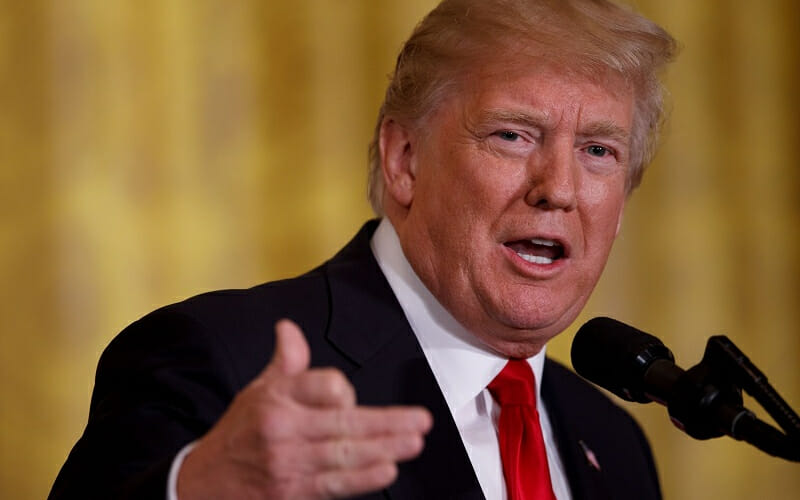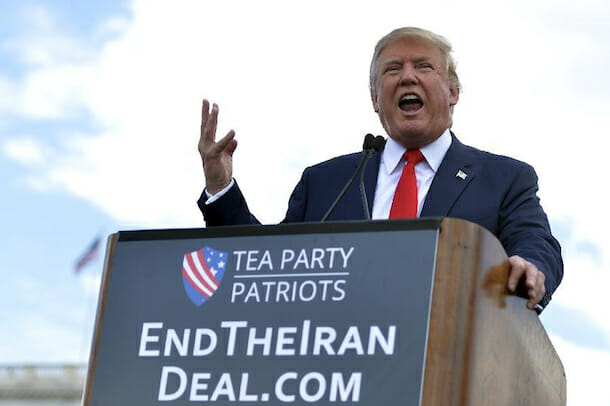
The Alarmists Are Wrong About Withdrawal from the Iran Deal
President Donald Trump’s recent decision to withdraw from the Iran nuclear deal sent Washington’s pro-Tehran community scrambling to remember their social media passwords in a fierce effort to document their moral indignation and indict those supportive of scrapping the Joint Comprehensive Plan of Action (JCPOA).
But the real presentment was of the status quo, and JCPOA was dismantled like a guilty defendant without adequate counsel.
Unable to manufacture even a credible case based on the evidence, Washington’s pro-Tehran alarmists seemed more committed to protecting the nuclear deal than protecting American interests. And by dodging questions about the regime’s complicity in atrocities in Syria, Iraq, Yemen, Lebanon, and Gaza – to say nothing of Tehran’s abysmal human rights record against its own citizens – the regime’s advocates mustered only weak punches in defense of the agreement’s failings.
Writing for The New York Times, Gardiner Harris observed, “The bile from normally high-minded experts has been remarkable.” President Obama’s chief arms control official, Jon Wolfsthal, took to Twitter to pin responsibility on leading Iran deal critic, Mark Dubowitz, of the Foundation for the Defense of Democracies: “You own this. Say anything you want. You own this.”
Barbara Slavin of the Atlantic Council, caught giving the middle finger to pro-democracy Iranian dissidents gathered to protest Iran’s Foreign Minister Javad Zarif at the Council on Foreign Relations in 2017, also took to social media but chose to prosecute Dubowitz for Tehran’s future nefarious activities: “Trump made this decision long ago. But you facilitated it and will also own the consequences.”
Writing for USA Today, Wolfsthal conjured up his best scare tactic contending that Trump had “shattered global unity, leaving no way to recreate the kind of pressure that forced Iran to end its nuclear efforts in 2015.”
The shrill assertions brought to mind the parable embodied by the children’s tale Chicken Little, featuring a fable with a chicken whose repeated declaration that “the sky is falling” is eventually found to be false prediction resulting from hysteria, not evidence.
Withdrawal from the Joint Comprehensive Plan of Action is neither indicative of the sky falling nor is an imminent calamity on the horizon. The administration’s willingness to challenge the status quo is good for U.S. interests and also the aspirations of the Iranian people.
The regime’s sympathizers can hardly claim the nuclear deal was deterring Iran’s malign activities, nor can it be argued that the agreement was stemming the regime’s ballistic missile buildup or nuclear breakout potential. In fact, the JCPOA did not change Tehran’s behavior at all but rather allowed it to develop ballistic missiles – essential to the delivery of nuclear warheads – while ignoring the economic benefits from sanctions relief that flowed to the Iranian Revolutionary Guards Corps (IRGC), not Iran’s people.

With the regime vulnerable and on its heels – but still sponsoring violence across the region and developing technology critical to a nuclear strike against the U.S., Israel, and regional allies – the time is ripe for change. Below are 4 immediate steps that the U.S. can take:
1. Support the Iranian Opposition
U.S. policy toward Iran needs to be backed by a comprehensive strategy that not only addresses the nuclear threat but also promotes domestic institutions that stand in opposition to the IRGC. Chief among these is the National Council of Resistance of Iran (NCRI), the regime’s longstanding, pro-democracy parliament-in-exile, which enjoys broad support in North America, Europe, and around the globe. To leverage the discontent on the Iranian street, U.S. officials should support the opposition’s efforts to push back on the Iranian regime. The NCRI and its leading constituent group, the People’s Mojahedin Organization of Iran (MEK/PMOI), would benefit from timely public support from the Trump White House.
2. Accelerate and Expand the Iran Protests
In December and January, the Iranian people sent an unambiguous message to their clerical rulers by staging unrelenting anti-regime protests and insisting that their calls for democracy deserved to be heard. Demonstrators took to the streets chanting “death to Khamenei,” “death to Rouhani,” and “hardliner, reformer, the game is now over.” The demonstrations quickly spread to over 140 cities and continue sporadically to this day. The show of force prompted a phone call to French President Emmanuel Macron to complain about the Peoples Mojahedin Organization of Iran (MEK/PMOI) opposition group and exposed the chief vulnerability of the regime – their own people are not behind them. The demonstrations are indicative of a fierce and growing cancer inside Iran and enormous frustration with the regime’s corruption, incompetence, and misplaced priorities. There has never been a better time for a thorough counterintelligence review of Iranian influence operations underway in the U.S and globally. By exposing the regime’s lobbyists and laying bare their intricate disinformation campaign, U.S. officials can nurture the ideas that will lead to an internal rebellion and topple the regime from within.
3. Stiffen Penalties for Iranian Belligerence & Sanction those Supporting the Regime
The White House must demand an immediate halt to all ballistic missile tests and issue stiff penalties if restrictions are violated. To date, the tests have been met with rhetoric but not backed by the credible threat of force. In addition, while Congress is likely to renew strong sanctions against the regime, there remain myriad individuals, organizations, and affiliates acting on behalf of Tehran that are engaged in dubious financial transactions, illicit purchases, weapons shipments, corruption, bribery, human rights abuses, and suppression that require additional scrutiny and need to be targeted by U.S. officials.
4. Leverage Connections with the Iranian People to Promote Regime Change
In his speech nullifying the JCPOA, Trump indicated that the “future of Iran belongs to its people” and observed that “great things can happen” once the world stops appeasing and enabling the clerical regime. The opportunity to build on White House support for the Iranian people will be underscored on June 30th when the NCRI hosts a major gathering of more than 100,000 freedom-seeking dissidents in Paris. The event will feature political leaders from the U.S. and Europe, including leading academics. Speakers at the gathering will expand on the message delivered by Iranian opposition leader Maryam Rajavi that “Eradicating the clerical regime’s nuclear and terrorism threats means getting rid of the regime in its entirety” and make the case that absolute rule of the clergy cannot exist without terrorism, suppression, and weapons of mass destruction.
